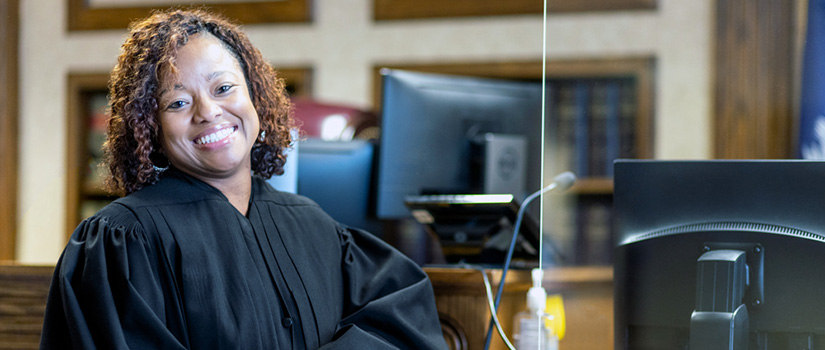Judge DeAndrea Gist Benjamin's enthusiastic support of the USC Rice School of Law's externship program offers her a way to mentor and inspire the next generation of Gamecock lawyers.
Benjamin ('97) was appointed to South Carolina's 5th Judicial Circuit in 2011. That was the same year the externship program was established to allow students to work with and learn from practicing judges and attorneys.
Just a year into her appointment, Benjamin invited externship students to work with her court.
For more than a decade, students worked with Benjamin in the 5th Judicial Circuit, and when she was confirmed in 2023 as a judge to the U.S. Court of Appeals for the 4th Circuit, she saw a unique opportunity.
“I told Dean (William) Hubbard I would really like to offer students an opportunity to come to Richmond [Virginia] and he said, ‘You got it,’” Benjamin says. “My externs will be able to say that they observed arguments at the 4th Circuit. Many practicing lawyers in South Carolina don’t have that experience.”
As part of the externship program, students spend eight hours a week for 13 weeks in a field placement working under the supervision of an attorney or judge. Students also participate in a seminar led by a professor with subject-matter experience who guides students as they reflect on their time in the field and integrate what they learn into burgeoning professional identities.
“I think the best part about this externship was working on real cases going up for argument,” says 3L Genesis Gonzales, who externed with Benjamin in fall 2023. “I'm helping these cases, these people, by giving as much information as I can to Judge Benjamin, so she and the other judges can make a decision.”
Externships are mutually beneficial, with students learning from judges and attorneys, discovering new career opportunities and honing their legal skills. Supervisors also benefit from students’ legal research and writing skills and how recently they’ve taken fundamental law courses. They benefit intangibly, too.
“The externship supervisors definitely appreciate how much easier the externs can make their workflow,” says Stephanie Nye (‘99), director of externships. “They're also getting the opportunity to engage with these new legal minds. I hear over and over from supervisors about the sense of fulfillment they get from helping students transition into the legal practice.”
For some students, externships are their first exposure to the practice of law, and the stakes can be high, which may be why Benjamin places such importance on identifying the right fit when selecting externs for her chambers.
“Personality is a big part of working together here and with other chambers,” Benjamin says. “You can have the smartest person in the world, but it doesn’t matter if you can’t work well together.”
Benjamin’s insistence on a congenial workplace is apparent to emerging legal professionals from the USC Rice School of Law.
“They're such hard workers and they're dedicated. You can tell by the quality of their work and from how they interact with each other,” Gonzales says. “I never realized chambers were fun – I didn’t think it would be so open and collaborative. Judge Benjamin is phenomenal, the way she handles everything. She's like Superwoman. Working with her was so inspiring.”
The externship with Benjamin is based in Columbia, but toward the end of the semester students travel with Benjamin to Richmond to tour the 4th Circuit court. They also hear arguments they helped prepare during their externship and discuss proceedings with Benjamin after. Fall 2023 externs were afforded the unique opportunity to participate in Benjamin’s investiture and meet judges from other courts, including alumna Judge J. Michelle Childs (’91), who sits on the U.S. Court of Appeals for the District of Columbia Circuit.
In addition to externships, Benjamin also participates in the Judicial Observation Experience program, where students spend up to two weeks during the summer observing daily routines and proceedings in South Carolina’s state judiciary and federal courts then discussing their observations with judges.
Though Benjamin makes it look easy, Nye knows the time and energy it takes to effectively mentor the breadth of students she works with throughout the year.
“We are so fortunate to have her as a judge and an alumna of the law school – to give back to us in this way and to open up those courthouse doors for our students,” Nye says. “She has just gone above and beyond. Allowing three or four externs to join her on the 4th Circuit shows her commitment to the students’ growth and her support of the law school.”
Benjamin’s dedication and enthusiasm are clear to her externs, which is why she receives such positive reviews at the end of each semester. When asked whether Benjamin sees externships as an extension of her community service, it’s easy to see what students enjoy most when working with her.
“It’s not typical community service, but it’s all about building lawyers of the next generation, coming along to take my job so one day I can retire,” Benjamin says with a laugh. “Twenty years from now, I hope they’ll be able to share how this experience impacted their career decisions and when they’re in this position they’ll do the same.”
